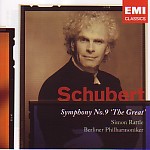This is a disgusting performance. Granted, Schubert’s Ninth is a very difficult work to play and conduct, but there is no excuse for treating it as Simon Rattle and the Berlin Philharmonic do here–as a blank slate to disfigure with thickets of senseless and vulgar interpretive graffiti. Scarcely a phrase parades by without some sort of distorting mannerism: an oily legato, a sudden hairpin diminuendo and crescendo, or a gratuitous ritard. Two examples: What purpose does the sudden dynamic swell in the scherzo’s two opening phrases serve? Why kill the momentum at the opening of the finale by holding back the tempo for the theme’s long notes? These aren’t merely ideas of subjectively questionable merit; they are decisions contrary to the clear intent of the music, inimical to its expressive point. Scarcely a minute goes by without some new foolishness perpetrated at Schubert’s expense.
Consider the andante, devoid of its “con moto” designation, lasting more than 16 dragging minutes and phrased by the oboe with a flaccid, slick legato. What purpose does it serve to rob the music of the necessary rhythmic snap? Compare this to Furtwängler with the same orchestra, who is a minute slower overall but who sustains his chosen tempo by emphasizing the movement’s march-like character and expressive bleakness rather than minimizing it as Rattle does. In other words, it’s certainly possible to play the music this slowly if the interpretation makes clear the reason for the choice in terms of the resultant emotional payoff. Rattle offers no such explanation. There’s also no excuse for his insensitivity to balance at the movement’s climax, the horns and trumpets obliterating the melody in the strings while the gradual slackening of the tempo sucks all of the energy out of what should be an explosive final cataclysm.
In the first movement it is quite evident both here and elsewhere that Rattle simply does not understand how to articulate a sonata-form movement so as to preserve its sense of forward motion toward an ultimate goal. Perhaps it’s a generational thing, since he’s hardly alone in this regard, but there’s no other way to explain his ineptitude in handling the transition to the principal allegro (after a painfully limp and fussy introduction), where the string triplets get lost in the general crescendo and the trumpets fail to cut through the texture as they should. In the main body of the movement, Rattle’s relentlessly choppy phrasing breaks the exposition up into a series of disconnected bits. There’s no flow, no overarching feeling of athletic, muscular drive connecting one section to the next. The coda is irredeemably flat-footed and tinny-sounding.
As for the Berlin Philharmonic, it has been clear for some time that the wholesale replacement of personnel begun under Claudio Abbado has created what is effectively a new ensemble, one utterly devoid of the kind of corporate identity typical of the world’s great orchestras. If the Vienna Philharmonic had been asked to play this symphony, however demented the guidance from the podium, the performance would bespeak to some degree its corporate identification with and longstanding performance tradition of Schubert. The Berlin Philharmonic no longer has the right to claim such a pedigree, in German or any other music. It is a collection of extremely talented individuals, nothing more, and under Rattle they might as well be the City of Birmingham Symphony for all the special character they bring to the music that they play.
I am very interested to see the reaction of the foreign press to this interpretive travesty. For me, amid much that is unquestionably good and right, it represents everything that is wrong at the big money, heavily subsidized arts institutions. I find it particularly ironic that the rationale for using taxpayer’s money to support organizations such as the Berlin Philharmonic–namely, to preserve a great musical tradition and assure its ongoing health–has achieved just the opposite. What we have here, evident to anyone who bothers to compare the sound of this orchestra in this work under Rattle to what it produced for conductors as diverse as Furtwängler, Karajan, Böhm, and Wand, is a soulless parody of good playing and good taste, a narcissistic joke made at Schubert’s expense. Whatever else this team may go on to achieve in future, there is no question that they are banking on a historical reputation and tradition of playing that they are unlikely to sustain.
































